| October 12, 2008 |  |
MarsDaily Advertising Kit |
| Previous Issues | Oct 10 | Oct 09 | Oct 08 | Oct 07 | Oct 06 |
Phoenix Lander Digs And Analyzes Soil As Darkness Gathers Pasadena CA (SPX) Oct 10, 2008
Pasadena CA (SPX) Oct 10, 2008As fall approaches Mars' northern plains, NASA's Phoenix Lander is busy digging into the Red Planet's soil and scooping it into its onboard science laboratories for analysis. Over the past two weeks, Phoenix's nearly 2.4-meter-long (8 feet) arm moved a rock, nicknamed "Headless," about 0.4 meters (16 inches), and snapped an image of the rock with its camera. Then, the robotic arm ... more An Opportunity For A Tour Will Be An Endeavour  Pasadena CA Oct 04, 2008
Pasadena CA Oct 04, 2008Opportunity has embarked on the next great challenge -- a journey of 12 kilometers (7.5 miles) southeast to a huge hole in the ground nicknamed "Endeavour Crater." Measuring 22 kilometers (14 miles) from rim to rim and plunging 300 meters (1,000 feet) below the surface, Endeavour Crater is significantly larger than "Victoria Crater," which is 730 meters (almost half a mile) wide and 70 meters (2 ... more Nicaraguan Volcano Provides Insight Into Early Mars  Moffett Field CA (SPX) Oct 01, 2008
Moffett Field CA (SPX) Oct 01, 2008Volcanic eruptions were commonplace on ancient Mars, when vents and fissures spewed out gases like water vapor, carbon dioxide, sulfur dioxide, and hydrogen sulfide. Such locales were very hot and very acidic - characteristics that would seem to be inhospitable to life. But in recent years researchers have discovered a vast array of primitive organisms living in analogous environments on Earth. ... more Mars Lander Sees Falling Snow, Soil Data Suggest Liquid Past  Pasadena CA (SPX) Sep 30, 2008
Pasadena CA (SPX) Sep 30, 2008NASA's Phoenix Mars Lander has detected snow falling from Martian clouds. Spacecraft soil experiments also have provided evidence of past interaction between minerals and liquid water, processes that occur on Earth. A laser instrument designed to gather knowledge of how the atmosphere and surface interact on Mars has detected snow from clouds about 4 kilometers (2. 5 miles) above the ... more The Ancient Rains Of Mars  Bonn, Germany (SPX) Sep 29, 2008
Bonn, Germany (SPX) Sep 29, 2008About four billion years ago, there were lakes on Mars which may have been fed by short-lived rivers that were, in turn, fed by precipitation. These lakes filled craters that were formed by the impact of meteorites. Water accumulated in places where rivers broke through the crater rims. Deltas were formed at the mouths of the rivers, similar to how they are formed where rivers flow into ... more |
mars-mers
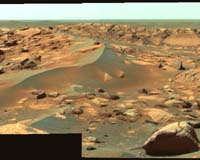 mars-mers 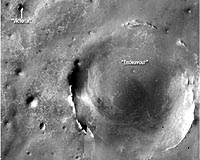 mars-mro  |
 Washington (AFP) Sept 25, 2008
Washington (AFP) Sept 25, 2008Milestones in the history of manned space flight: -- 1st century AD: A simple explosive substance appears in China. To create a festive effect, containers filled with it are believed to have been thrown onto fires, whereupon they sometimes flew up into the air. -- 1232: The first documented use of "fire-sticks" as weapons -- by Chinese forces repelling a Mongol invasion. ... more Space key to mankind's survival: NASA chief  Washington (AFP) Sept 25, 2008
Washington (AFP) Sept 25, 2008Mankind's very survival depends on the future exploration of space, said NASA chief Michael Griffin in an interview with AFP marking the 50th anniversary of the US space agency. This journey, said the veteran physicist and aerospace engineer, is full of unknowns and has only just begun. "Does the survival of human kind depend upon it? I think so," he said. Griffin compared the first ... more Meteorite experiment deals blow to 'bugs from space' theory  Paris (AFP) Sept 25, 2008
Paris (AFP) Sept 25, 2008A novel experiment has dealt a setback to a theory that life on Earth was kickstarted by bacteria that hitched a ride on space rocks. The "pan-spermia" hypothesis is that cells were transported to the infant Earth on rocks that were bumped off other planets or even came from another star system. The theory gained a boost in 1996 when a group of US scientists proposed that a famous meteor ... more NASA marks 50th birthday, looks to new frontiers  Washington (AFP) Sept 25, 2008
Washington (AFP) Sept 25, 2008Half a century after NASA was created at the height of the Cold War when the United States sought to prove its superiority by winning the race to the Moon, the space agency faces new challenges ahead. At its conception NASA sought to assert American dominance over the Soviet Union, but in the new 21st century it finds an emerging rival in the space race: China. The birth of the National ... more |
nasa
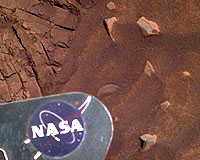 dragonspace  extrasolar 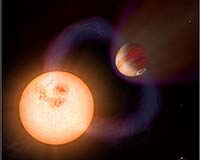 |
 Pasadena CA (SPX) Sep 25, 2008
Pasadena CA (SPX) Sep 25, 2008With Martian winter on the wane, Spirit is using significantly less energy to stay warm. During the winter solstice, Spirit needed 90 watt-hours to run the heater. Now, the rover uses between 30 and 40 watt-hours. The reduced demand for power, more than the slow increase in solar-array input, has freed up energy for other things. In particular, Spirit has added more images to the ... more Rock Moved By Phoenix Lander Arm  Pasadena CA (SPX) Sep 25, 2008
Pasadena CA (SPX) Sep 25, 2008The robotic arm on NASA's Phoenix Mars Lander slid a rock out of the way during the mission's 117th Martian day (Sept. 22, 2008) to gain access to soil that had been underneath the rock. The lander's Surface Stereo Imager took this image later the same day, showing the rock, called "Headless," after the arm pushed it about 40 centimeters (16 inches) from its previous location. ... more Mars Polar Cap Mystery Solved  Paris, France (ESA) Sep 23, 2008
Paris, France (ESA) Sep 23, 2008Scientists are now able to better explain why Mars's residual southern ice cap is misplaced, thanks to data from ESA's Mars Express spacecraft - the martian weather system is to blame. And so is the largest impact crater on Mars - even though it is nowhere near the south pole. Like Earth, Mars has frozen polar caps, but unlike Earth, these caps are made of carbon dioxide ice as well as ... more Growing Library Of Mars Spectrometer Images  Pasadena CA (SPX) Sep 23, 2008
Pasadena CA (SPX) Sep 23, 2008A September 2008 release of 1,575 new images, such as this one, from the Compact Reconnaissance Imaging Spectrometer (CRISM) on NASA's Mars Reconnaissance Orbiter brings the number of released, high-resolution CRISM images to 4,580. This image in enhanced color from visible-light wavelengths shows light-toned rugged highland material in an area near the Martian equator. It covers an area ... more
|
mars-phoenix
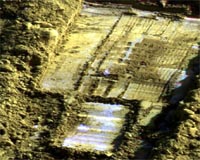 mars-phoenix  mars-mers 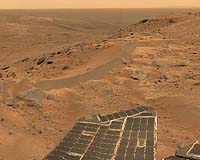 |
| Previous Issues | Oct 10 | Oct 09 | Oct 08 | Oct 07 | Oct 06 |
| The contents herein, unless otherwise known to be public domain, are Copyright 1995-2007 - SpaceDaily. AFP and UPI Wire Stories are copyright Agence France-Presse and United Press International. ESA Portal Reports are copyright European Space Agency. All NASA sourced material is public domain. Additional copyrights may apply in whole or part to other bona fide parties. Advertising does not imply endorsement, agreement or approval of any opinions, statements or information provided by SpaceDaily on any web page published or hosted by SpaceDaily. Privacy statement |